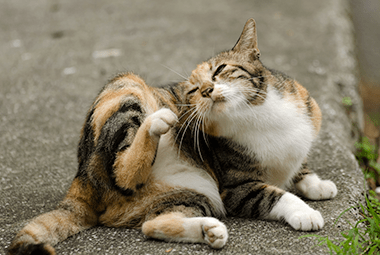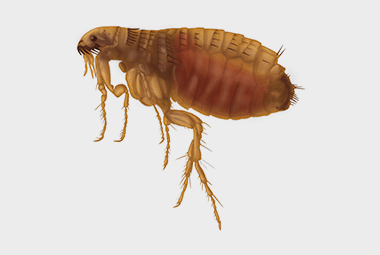Fleas are tiny, flat, six-legged, reddish-brown colored parasites that feed on the blood of warm-blooded hosts. These pests most commonly feed on cats, dogs, and humans inside homes across the United States but are also spread by wild animals outdoors. Fleas have the ability to jump vertically up to eight inches and frequently travel on skunks, raccoons, and opossums. These parasitic pests will also hitchhike inside homes on shoes, pant legs, and pets; once indoors, they will reproduce very rapidly. The lifespan of a flea is about one-hundred days, which is enough time for a female to produce up to five-hundred eggs that will then be deposited in carpets, bedding, and other areas around your home.
Though these pests are definitely a nuisance, they can also be dangerous to both humans and pets. Fleas carry and transmit murine typhus, and are also intermediate hosts of tapeworm. Flea bites result in raised, itchy bumps that can cause flea allergy dermatitis; in some cases, these bites cause secondary infections due to the excessive scratching.
Fleas love warm, humid climates which is why pets and pet bedding along with the Tennessee climate is so appealing making it a hot-bed, literally, for fleas. Here are some warning signs you can be looking for in your home that may indicate that you have a flea infestation:
- If your pet is exhibiting unusual behavior like excessive scratching, licking, or biting, especially around head, neck, tail, and groin, your pet may be infested with fleas; this itching is caused by the fleas crawling on your pet and feeding on their blood.
- Noticing red spots on the skin of humans or pets, which may be flea bites. Some people or pets may experience an allergic reaction to the flea saliva; these spots can also easily turn into a lesion and can lead to a secondary infection.
- If your pets are experiencing hair loss, this may be a sign that they are experiencing an allergic reaction to fleas or flea bites, but it can also be due to the excessive biting and licking.
- If your pet is being fed on by fleas regularly, your pet may become anemic; pale gums are a common sign of this.
- Finding flea dirt, which is small black or reddish-brown flecks that look like dirt, on your pet or pet bedding is a sign of bed bug activity; these are actually flea feces that are made up of digested blood.
It is important to treat your pets with a flea deterrent prescribed by your veterinarian on a regular basis; however, treating your pet and taking preventive measures against them will not necessarily prevent a flea infestation. Since fleas are very difficult to get rid of and can cause some serious health problems, you should seek the help of a professional pest control company like Russell’s Pest Control in Eastern Tennessee to handle any flea problems you are experiencing! We can eliminate an entire infestation of fleas and prevent them from coming back! Contact us at Russell’s Pest Control to learn more about our residential pest control options.

